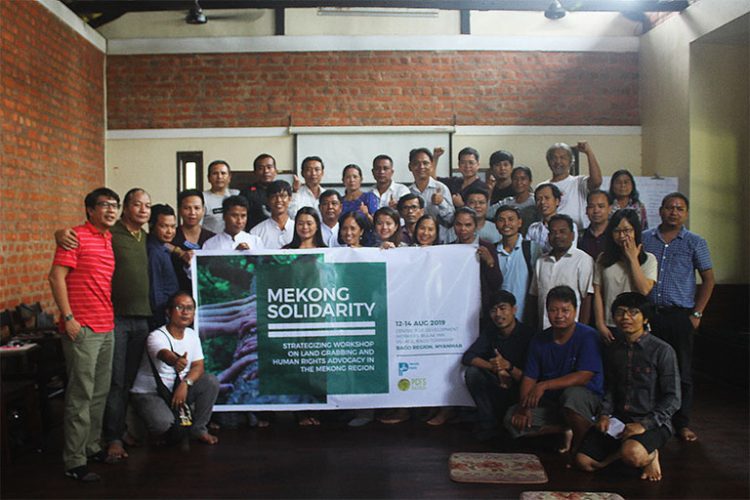Bago Region, MYANMAR | Representatives from Laos, Cambodia, Vietnam, and Thailand, together with local hosts and members of farmers’ organizations, joined a strategizing workshop on land grabbing and human rights violations in Bago Township, Myanmar, on 12 to 14 August. The workshop was co-organized by PAN Asia Pacific, the People’s Coalition on Food Sovereignty (PCFS), Ethnic Concern, and Farmer Affairs Network (FAN).
The delegates shared their various expressions of resistance to both government- and business-initiated land grabs and highlighted issues common to all countries in the Mekong sub-region. They also enumerated land policies like the Vacant, Fallow, and Virgin (VFV) Land Law in Myanmar that not only stir rural unrest and pose risks of displacement, but also ultimately serve private profit.
“When foreign investors come to our countries, the governments usually manage the projects and conceal human rights violations due to these incursions,” said Jimmy Rezarboi, director of Myanmar-based group Ethnic Concern. “The role of civil society, land rights defenders, and many other groups should be to counter efforts at dispossession by companies as facilitated by the government.”
Besides deepening knowledge of emerging trends related to the access to and control of land and resources in the region, the civil society organizations and NGOs present vowed to begin coordinating campaigns based on key pressure points and potential areas of collective engagement.

The three-day workshop also affirmed China as a major player in the sub-region where aggressive takeover of land and resources is concerned. Chinese investments, for one, have increased to varying degrees in hydropower, infrastructure, and agriculture in all five Mekong countries. “China is not only buying up or taking over lands,” said Arnold Padilla, coordinator of PANAP’s Food Sovereignty Programme, referring to China’s centerpiece project Belt and Road Initiative (BRI), “It’s also starting to create markets for its prospective agricultural products.” The aggression and ever-growing influence of China extend as well to the global level as the crisis of overproduction and land and resource concentration intensifies, said Rahmat Ajiguna, secretary general of the Asian Peasant Coalition. He discussed ways of how a resistance movement can respond to and confront these political and economic conditions that propel land grabs.
“The people’s movement is important to build multi-sector resistance and alliance,” said Ajiguna. “What we hope from our report is actually to stress the need for a push from different mass organizations to promote genuine agrarian reforms for the people.”








Discussion about this post